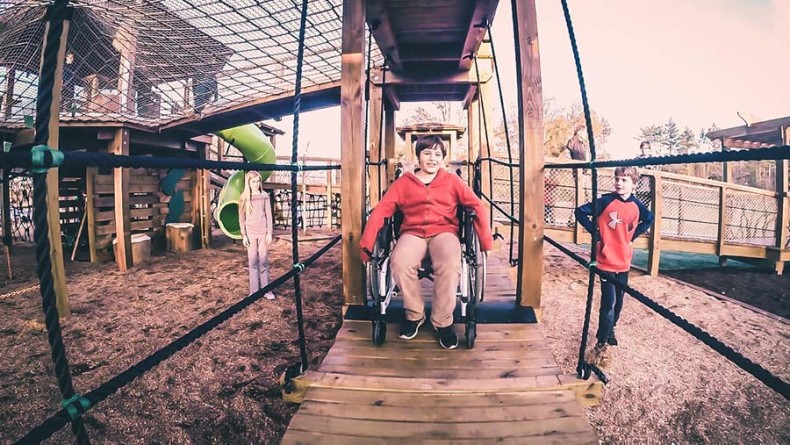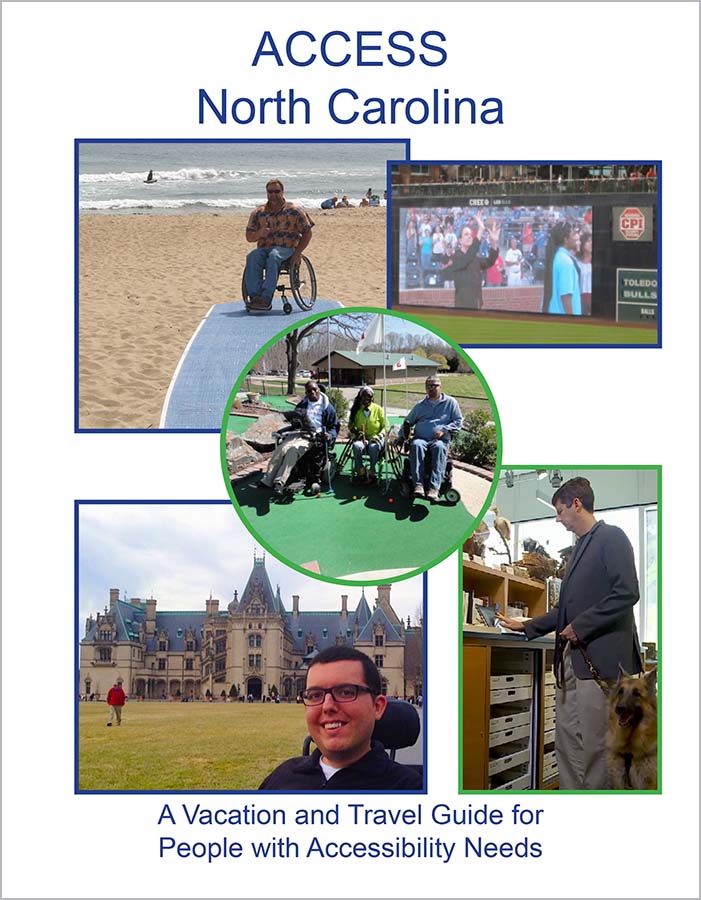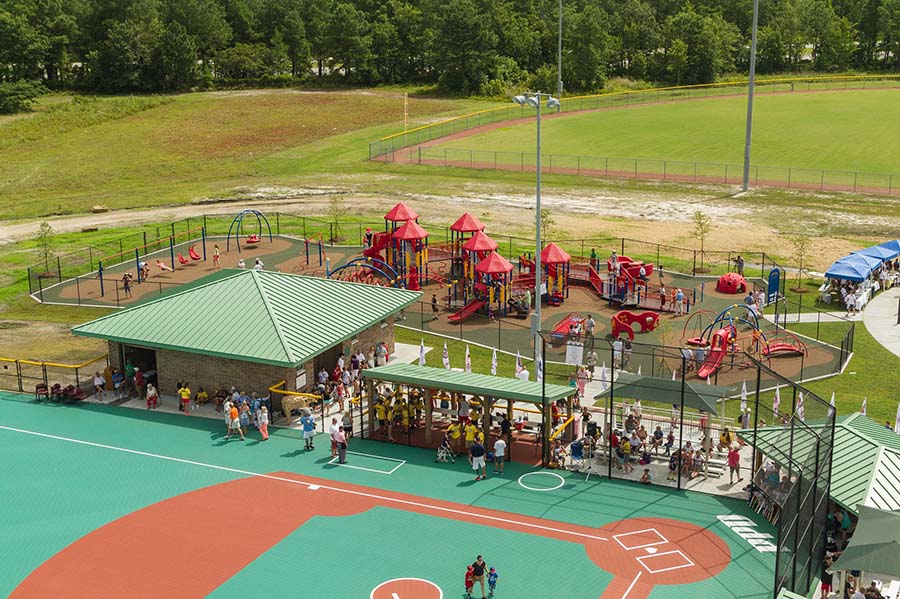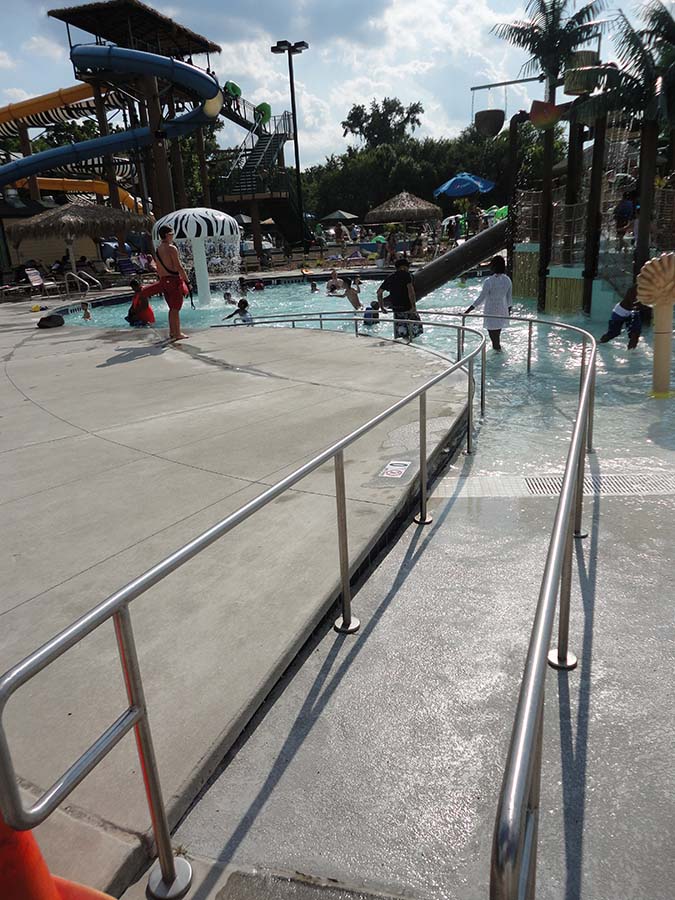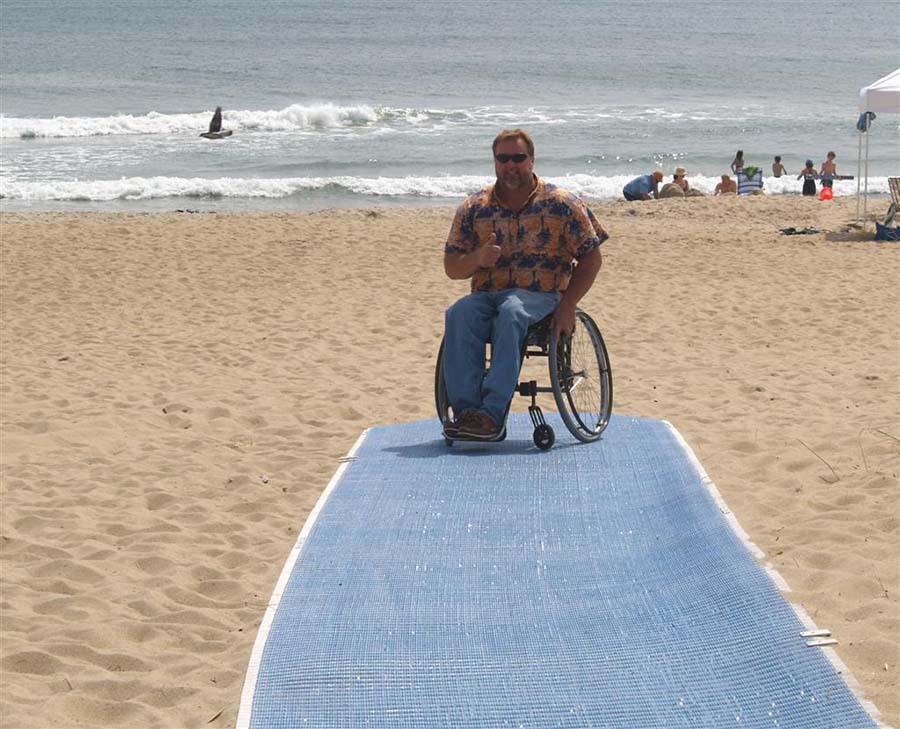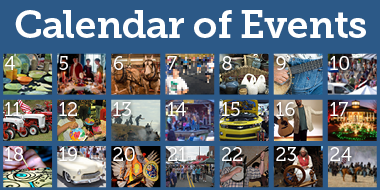Accessible attractions
Awareness, resources make travel easier for people who are disabled
By Karen Olson HouseIt’s a real understatement to say people who have disabilities encounter challenges when they visit most travel attractions. Those with mobility issues encounter steep stairs and too-high displays. Those hard of hearing work to follow videos without captions and narrated tours without scripts. Those with vision loss can’t read key directional signage, not to mention exhibit posters.
The reasons for these challenges include tight budgets and lack of awareness. An older attraction’s facility may not be updated to the design standards of the Americans with Disabilities Act. But a facility can also technically meet ADA standards for accessible design but still not be fully accessible.
“The letter of the law doesn’t always mean true access,” says Dr. Cynthia Edwards. Edwards, who has multiple sclerosis, recently described how a public restroom can meet ADA requirements, but be extremely difficult to use in a wheelchair due to elements such as poor door placements and tight spaces.
Another key issue: awareness about assistance. Like any traveler, persons who are disabled may need help but facility staff and the general public are uncertain as to how to offer it. They may avoid people with disabilities because they are not sure how to approach them. Edwards, a psychology professor at Meredith College in Raleigh, was happily surprised during a trip in Paris when staff at tourist attractions consistently made a point of asking if she needed assistance by speaking directly to her, as opposed to talking to the friend pushing her wheelchair.
Edwards points out one inexpensive solution would be to create a short training video on accessibility and etiquette for distribution to North Carolina attractions. To accomplish this, she suggests creating a small taskforce with travel professionals, curators, videomakers and persons with varied disabilities.
ACCESS North Carolina guide
This helpful, 502-page pdf provides tourist site accessibility information, with clear icons that indicate if a site is accessible, partially accessible or not accessible for a person with a specific disability. It offers general information about each tourist site and specifics dear to people with disabilities.
The guide’s main categories are Physical Disabilities (mobility), Deaf and Hard of Hearing, and Vision Loss (including blind), with notes about other disabilities as well. For example, a listing may say a site’s tranquil setting may benefit visitors with autism and visitors with mental disabilities (Roanoke/Cashie River Center). It also notes practices like waiving the fee for an aide accompanying a person with a disability and describes partially good/partially bad aspects such as there is recorded narration but no script available.
Author Philip Woodward has been writing it since 2009. Although budget cuts last year eliminated all funding for the ACCESS North Carolina program and Woodward’s access specialist position, he was able to update the pdf last fall and then he transferred to the North Carolina Council on Developmental Disabilities. Previously printed and distributed, it is now available only online.
Woodward has a special passion for accessibility, as he’s had profound hearing loss since age 4. His keen ability to experience a site as one would with different disabilities and knowledgeable advocacy have proved invaluable (not to mention his patience with a tape measure).
He encourages tourist attractions and individuals with disabilities and their family members and travel companions to send him their updates, photos, travel experiences, and questions via accessnorthcarolina@gmail.com, or call him at 919-518-9525 (office VideoPhone).
Attractions
These edited descriptions were taken from information in the 2015 ACCESS North Carolina pdf. The Interstates 1-77 and 1-95 are dividing lines for the regions here. Consult ACCESS North Carolina’s pdf and the site itself for more details.
Mountains
LifeSpan’s Blue Sky Nature Center
Troutman, Free
704-873-5646, lifespanservices.org
Certified Wildlife Habitat to meet needs of children and adults with developmental and physical disabilities, includes sensory and horticultural gardens, viewing decks, picnic area and amphitheater. One-fourth mile hardscaped walking trail with gentle slopes, at least 4-feet wide, ramp to lookout and benches, water fountain no more than 3‑feet high.
Flat Rock Playhouse
Flat Rock, Admission fee
828-693-0731, flatrockplayhouse.org
Substantial Accessibility. Professional theater company that stages a variety of productions each year, ranging from musical to comedy, Broadway standards to original works.
Kiwanis Miracle Playground and BRAX Stadium PPD Miracle Baseball field. Photo by ACCESS of Wilmington, Inc.
Cradle of Forestry in America, Forest Discovery Center
Pisgah Forest £ Admission fee
828-877-3130, cradleofforestry.com
Fifteen hands-on exhibits, café, 18-minute movie, store activities include riding on the fire-fighting helicopter simulator over a forest fire and going underground to see which animals live under the forest floor. Camouflaged wheelchair lift; Braille trail map and tactile pillow tree wall; Adventure Zone trail, developed in consultation with the Autism Society of North Carolina.
Ashe County Cheese
West Jefferson, Free
800-445-1378, ashecountycheese.com
Cheese plant contains a factory-viewing room where visitors can observe different varieties of cheese and butter being made, store sells products made in the factory, other food, gifts. Floor-to-ceiling window provides a view into the processing area; benches for resting.
Wheels Through Time Museum
Maggie Valley, admission fee
828-926-6266, wheelsthroughtime.com
Home to more than 300 classic motorcycles, related exhibits and other vehicles. Ramp inside provides a closer look at one section of motorcycles; emergency exit ramp in the rear, antique wheelchair and a motorized wheelchair similar to the one that President Franklin D. Roosevelt used.
Biltmore Estate
Asheville, admission fee; reduced fee for visitors with disabilities who can’t view entire house
800-543-2961, Guest Services: 800-411-3812, biltmore.com
Includes a 250-room French Renaissance chateau, gardens, Winery, Antler Hill Farm, Inn. Neckloop Telecoil Couplers, printed copies of the audio guide available, scripts for all films, sign language interpreter upon request (call at least seven days before visiting); audio guide upon request, restroom signs have Braille. Call Guest Services for assistive items.
Piedmont
Daniel Stowe Botanical Garden
Belmont, admission fee
704-825-4490, dsbg.org
Themed gardens, Orchid Conservatory, gift shop and visitor pavilion. Twenty marked accessible parking spaces, level entrance, automatic door openers, brick paths at least 4 feet wide (with slopes), automatic sink faucets; fragrant Conifer Garden, 12 fountains for sensory experience.
The North Carolina Pottery Center
Seagrove, admission fee
336-873-8430, ncpotterycenter.org
Showcases the remarkable history and on-going tradition of pottery-making in N.C. Ramp at entrance, doors at least 32 inches wide, two accessible restrooms.
North Carolina Transportation Museum
Salisbury, Admission fee includes train ride
704-636-2889, nctrans.org
Includes exhibits, Barber Junction Depot (1913), reception center; Master Mechanic’s Office (1911); Flue Shop (1924); and Bob Julian Roundhouse (1924). Train ride has a wheelchair lift available with 15-minute notice, six spaces for wheelchair tie-downs, wheelchairs available, exhibit signs are wheelchair-accessible.
Guilford Courthouse National Military Park
Greensboro, Free
336-288-1776, nps.gov
American Revolution battleground is site of March 15, 1781 battle between American and British troops. Visitor center, auto, bicycle and foot trails, including 2.5 miles of battlefield walking trails, 28 monuments, 10-minute animated Battle Map Program, exhibits and bookstore. “Another Such Victory” film has a box that displays closed captions; 20-minute Tactile Map Program and Braille restroom signs, “Field Musick” exhibit plays battlefield music.
Discovery Place
Charlotte, Admission fee
704-372-6261, Accessibility Coordinator: 704-348-1976, discoveryplace.org
Substantial Accessibility. Discovery Place exists to ignite wonder, and provides extraordinary experiences that engage people in active exploration of science and nature.
Carolina Basketball Museum
Chapel Hill, free
919-962-6000, carolinabasketballmuseum.com
Artifacts, videos, photos, statistical and historical panels, UNC’s National Championship trophy collection, interactive presentations, Atlantic Coast Conference Tournament championships and many of the most exciting game finishes in Tar Heel history. Elevator, concrete walkways at least 4 feet wide with slight slopes and curb cuts; selected highlight videos captioned.
Durham Performing Arts Center
Durham, admission fee
919-680-2787, dpacnc.com
Substantial Accessibility. DPAC hosts shows ranging from concerts to Broadway musicals to children’s performances (seating capacity of 2,712).
Carolina Performing Arts
Chapel Hill, Admission fee
919-843-3333, carolinaperformingarts.org
Substantial Accessibility. Carolina Performing Arts presents a full spectrum of performing arts: internationally renowned recitalists and orchestras; dance and chamber ensembles; jazz, folk and world music performers; and opera and theater.
Dan Nicholas Park
Salisbury, free to visit, small fee for attractions
704-216-7803, dannicholas.net
A 425-acre park includes nature center, petting barn, carousel, Miner Moose Gem Mine, train ride, paddle boating, fishing and camping (tent or cabin). Park’s two mini-golf courses are ADA-accessible, not all playground structures are wheelchair-accessible, but main one has a ramp in the front and the back, one cabin has ramp; many signs have large print writing with good contrast; several signs have etchings good for a tactile experience.
North Carolina Botanical Garden
Chapel Hill, NC, Free
919-962-0522, ncbg.unc.edu
Native plant gardens, nature trails, education center. Ramp to gardens and buildings, Horticulture Therapy Demonstration Garden has five raised beds 22 to 24 inches high, Coastal Garden Bridge has wooden handrails; specific public programs for people with physical and mental disabilities.
NASCAR Hall of Fame
Charlotte, Admission fee
704-654-4400 or 888-902-6463, nascarhall.com
150,000-square-foot, high-tech venue is an interactive, entertainment attraction honoring NASCAR heritage with artifacts, interactive exhibits, and state-of-the-art theater, restaurant and gear shop. Accessible exhibits include ramps, alternate driving simulator, wheelchair lift; all videos captioned.
North Carolina Veterans Park
Fayetteville, Free
910-433-1457, ncveteranspark.org
Visitors Center includes Service Ribbon Wall made of fused glass, representing every service medal awarded since the Civil War, unique chandelier made from 33,500 “dog tags” (service member identification tags). Designed to be accessible to veterans with mobility disabilities; some videos captioned with all exhibit panels having descriptions; audio programs, ADA tactile features on specific signage; hands molded by veterans from all 100 N.C. counties that visitors with vision loss and tactile learners could enjoy.
Coast
Lions Water Adventure
Kinston, Admission fee
252-939-1330, lionswateradventure.com
Waterpark features 550-foot-long lazy river, 5,000-square-foot kiddie pool featuring fountains, slides, water dump buckets and water sprays, three water slides and full-service concession stand. Aqua wheelchair, ramps into the pool and a zero-entry pool and lazy river; audio description available and on website; audio sound at park features; bright, large pathway guidance; menus with Braille or large print.
Brunswick Town/Fort Anderson
Winnabow, Free
910-371-6613, nchistoricsites.org
Remains of colonial port town of Brunswick, great earth mounds of Confederate States of America’s Fort Anderson, St. Philip’s Anglican Church and artifact exhibits. Path through visitor center has a ramp, path to the fort has a bench along the way and ramp with handrails, excavated foundations are visible at low heights; script available for orientation video; site director will give a private tour to a visitor with vision loss upon requests.
Frisco Native American Museum & Natural History Center
Frisco, Admission fee
252-995-4440, nativeamericanmuseum.org
Center contains Native American artifacts, exhibits and natural history displays. Galleries filled with native art and artifacts include information on Native Americans across the U.S. Several acres of nature trails winding through lush maritime forest, spacious pavilion overlooks salt-marsh water. Large-print, routed trail signs, museum has large-print signs and offers special programs for visitors with vision loss, including nature trail walks; staff has provided special programs for adults and children with physical and mental disabilities.
Jennette’s Pier
Nags Head, Admission fee
252-255-1501, jennettespier.net
World-class fishing, grand pier house and public bathhouse perched atop wide beaches, 1,000-foot-long ocean pier. Inside pier house are educational exhibits, fish displays and a gift, snack and tackle shop. Standard wheelchairs, a beach wheelchair and golf cart assistance from parking lot to pier upon request, pier offers two accessible fishing areas with a lowered railing; Braille signs, and audio exhibits. Site hosts the N.C. Lions Club’s annual Visually Impaired Persons Fishing Tournament every October.
North Carolina History Center at Tryon Palace
New Bern, Admission fee
800-767-1560, tryonpalace.org
Rotating exhibitions, wide variety of interactive historical activities, The Pepsi Family Center, Regional History Museum and riverwalk café. Center is fully mobile accessible; all videos captioned, sign language interpreter with advance notice; “hands-on” policy for visitors with vision loss; many interactive, hands-on exhibits could benefit tactile learners.
Sylvan Heights Waterfowl Park
Scotland Neck, admission fee
252-826-3186, shwpark.com
More than 180 species of exotic ducks, geese, swans, parrots, pheasants, cranes, flamingoes and other birds. Watch a duckling hatch in a glass-topped incubator, and enjoy peaceful walking trails and gardens. Park has what probably is North Carolina’s only wheelchair-accessible tree house, which allows easy viewing of the swamp habitat 20 feet in the air; two wheelchairs available for visitors, golf cart tours.
Ability Garden at New Hanover County Arboretum
Wilmington, Free
910-798-7660, arboretum.nhcgov.com
Seven-acre garden’s horticultural therapy program offers inclusive, professionally directed activities. Ability Garden showcases examples of accessible gardening through raised beds, wheelchair-accessible tabletop gardens and adaptive garden tools. Please make arrangements prior to visiting.
The Lost Colony/Waterside Theatre
Manteo, admission fee
252-473-2127, thelostcolony.org
Highly acclaimed outdoor drama about the first English colonists held nightly except Sunday from late May/June through August. The theater provides audio-assist units (a driver’s license is required to borrow the unit) and will provide sign language interpretation with two weeks advance notice. Scripts available when sign language interpretation is not.
Maritime Museum at Southport
Southport, free
910-457-0003, ncmaritimemuseum.org
Nautical history of the “Lower Cape Fear.” Self-guided tour shows exhibits on Cape Fear Indians, piracy, early explorers, colonial Brunswick, Smithville, blockade runners, the steamboat era, wrecks and rescue, fishing and natural history. Many boat and ship models are on display. Guided tours are available to everyone upon request. Fully wheelchair-accessible.
Kiwanis Miracle Playground
Wilmington, Free
910-508-6788, miracleleaguewilm.org
Nine-thousand-square-foot playground includes wheelchair-accessible play structures on a specialized non-latex rubber turf, and features a double-wide ramp, five slides, seven swings, countless climbing structures, talk tubes, a children’s playground for toddlers and multiple sensory walls and structures for children with cognitive disabilities. Adjacent to BRAX Stadium PPD Miracle baseball field, which has a surface designed to allow wheelchairs and other mobile devices to safely move from base to base.
-
Share this story:

